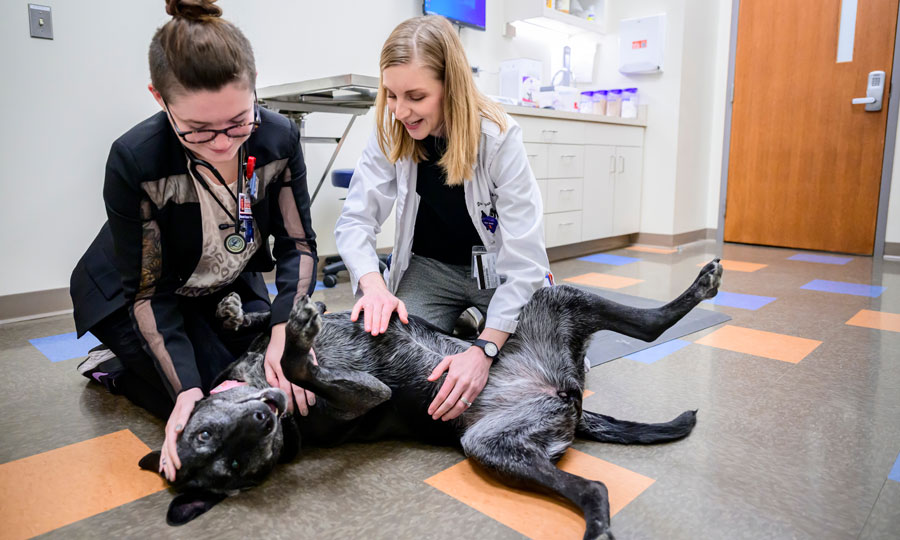Itchiness Could Mean Allergies
With winter’s dry air and cold temperatures, it’s no wonder everyone—including your furry friends—has dry skin! But unrelated to the weather, dry and itchy skin caused by allergies is a very common chronic problem in animals year-round. Dr. Clarissa Souza, a veterinarian in the dermatology service at the University of Illinois Veterinary Teaching Hospital in Urbana, says pets with allergies come to the hospital every single day.
“Allergies are definitely the most common skin disease we see in dermatology,” says Dr. Souza. “No matter what the cause of the allergy is in the pet, they all exhibit the same clinical sign: pruritus, which is veterinary-speak for itchiness.”
“Itchiness,” however, can look different in each patient. “Signs of itchiness include not only scratching but also licking and chewing paws, shaking heads, plucking hair, and scooting,” says Dr. Souza.
In addition to these more obvious signs of itchiness, there are also secondary effects that could indicate that an animal has allergies.
“Skin sores and ear infections are secondary signs commonly associated with allergies,” explains Dr. Souza. “In addition, your pet might have allergies if you notice that your animal has recurring lesions on the skin, excessive earwax, or smelly ears.”
It’s critical that these signs are noticed and acted on as early as possible, because allergies tend to progress over time and can negatively affect the animal and owners’ quality of life.
Diagnosing the Itch
According to Dr. Souza, the three major causes of allergies are external parasites, food allergies, and environmental allergies. When a pet is seen by the dermatology service at the Veterinary Teaching Hospital, steps are taken to discover the source of the itchiness.
“We perform a work up to figure out the cause,” Dr. Souza says. The first step is to ensure that the pet is regularly taking a medication to prevent parasites, mostly fleas and ticks. This will help to rule out an allergy caused by an ectoparasite.
The next step is to assess the likelihood of a food allergy. “The only way to diagnose or rule out a food allergy is to go through a restrictive diet trial,” she says. In this trial, certain foods will be left out of the diet to see if the problem is resolved. If the allergy problems persist after the food trial is over, an environmental allergy is the diagnosis and a treatment plan can be made for the pet.
Managing Allergies
It is critical for owners to understand that allergies aren’t something that will just go away. “There is no cure for allergies,” states Dr. Souza. “An owner should not expect to have one single treatment and have the problem fixed.” Chronic skin problems, such as allergies, will require life-long management. However, there is hope for these patients. Even though there isn’t a definitive cure for allergies, it is a manageable skin disease.
For dogs and cats allergic to ectoparasites, the consistent administration of medications to prevent flea and tick infestations will keep these animals comfortable. If food is the allergy cause, special diets will be recommended in order to avoid flareups.
But if an environmental allergy—the most common cause of allergies in animals, unfortunately—is diagnosed, medical therapy will be discussed. Treatment options for environmental allergy include daily pills, monthly injections, or even immunotherapy (allergy shots), which are developed based on the results of a skin test. The therapy is prescribed to control the itchiness and to avoid secondary skin lesions and ear infections.
If you have any questions or concerns about your pet’s skin health, schedule an appointment with your local veterinarian.
By Hanna Netisingha

![[bichon frise - allergies]](https://vetmed.illinois.edu/wp-content/uploads/2021/04/pc-souza-allergies.jpg)


